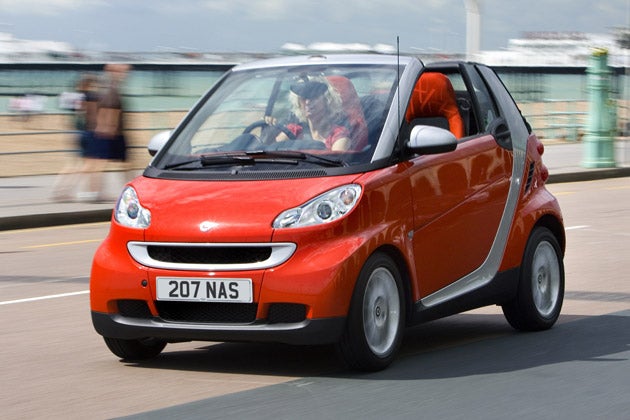Smart Fortwo Passion Coupe cdi

Price: £8,972
Top speed: 84 mph 0-60mph 19.8 seconds
Consumption: 85.6 mpg
CO2 emissions: 88g/km
Best for: trendy urban misers
Also worth considering? BMW Mini, Fiat 500, Toyota iQ
Two simple figures tell you a lot about the Smart Fortwo cdi: it returns 85.6mpg on the official combined-cycle fuel-consumption test and emits 88 grammes of CO2 per kilometre. That, so its manufacturer claims, makes it the most economical production car in the world. Some economy-minded buyers will consider that reason enough to buy this new diesel version of the Smart and won't enquire further. But if they do, they probably won't be put off by two other bits of data that are unlikely to make the Fortwo cdi the choice of enthusiasts – a top speed of 84mph and a 0-60mph time of nearly 20 seconds.
In truth, those performance figures are pretty much irrelevant, because the cdi's ability to move along nippily in its natural urban environment is not remotely in doubt, and all of the usual Smart virtues – extreme manoeuvrability and parkability combined with a surprising amount of space and comfort for two in a small stylish body – remain intact.
But even if you don't fancy the diesel there's still an economical Smart for you; the petrol version of the Fortwo has recently had an eco makeover, emerging with what the industry usually calls mild hybrid technology and Smart calls micro hybrid drive (mhd). That means it has a variant of the automatic "stop-start" systems that several manufacturers have been adopting to squeeze a few more miles out of each gallon of fuel, especially in urban driving. In fact, the Smart system cuts off the engine when the car slows to below 5mph, not just when it's at rest, and allows the mhd version to achieve 65.7mpg on the combined cycle test – that represents an impressive 9 per cent improvement over the previous, unmodified petrol-engined model, although it's not as good as the diesel. On the other hand, the mhd is a bit quieter than the cdi, and the gear-change on the automated manual gearbox works more smoothly as well.
And if all that's not enough, there's an electric Smart on the way too. I've already had the chance to drive a first-generation example converted to battery operation and can safely say that if ever a car were suited to electric drive, the Smart is it. A new electric model based on the current post-2007 second-generation body shell, and using improved lithium-ion batteries, promises to be even better – sadly, it will initially be made only in small numbers for trials. Still, there's always the diesel, I suppose.
Subscribe to Independent Premium to bookmark this article
Want to bookmark your favourite articles and stories to read or reference later? Start your Independent Premium subscription today.

Join our commenting forum
Join thought-provoking conversations, follow other Independent readers and see their replies